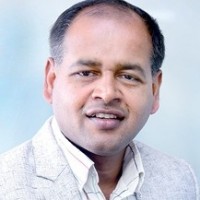Prerogatives Of The Prime Minister

Gopal Khanal
Respecting the spirit of the new found unity within the ruling Nepal Communist Party (NCP), Prime Minister KP Sharma Oli is holding a series of parleys with co-chairman Pushpa Kamal Dahal Prachanda over the reshuffling the cabinet, but they are yet to forge consensus on it. It is clear that the cabinet reshuffling is an absolute prerogative of Prime Minister, but PM Oli has adopted a pragmatic approach to finalise the names of new ministers based on mutual consultation and understanding.
The party's renewed unity demands this sort of consultative culture to run both the government and the party effectively and efficiently. The people have sought decisive role and intervention from the powerful communist government in addressing their burning issues, particularly the health and livelihood problems in the face of COVID-19 pandemic. Taking into consideration the unprecedented crisis facing the country, the Prime Minister has demonstrated flexibility to avoid unnecessary intra-party political bickering. Nonetheless, his generosity must not be construed as his weakness.
Parliamentary practice
In the parliamentary practice, Prime Minister wields sole constitutional power to appoint and dismiss ministers, enabling him to politically control the government. Cabinet ministers are mandatorily appointed from the sitting members of parliament. But, in some parliamentary exercises, ministers can be appointed from outside the parliament, but they should be members of parliament as per the provision of their constitution. As per Article 78 (1) of the constitution, “the President, may, on the recommendation of the Prime Minister, appoint a person who is not a member of federal parliament. But he must obtain membership of Parliament within six months from the date of taking oath by him or her”.
Similarly, a person who has been defeated in the election to the House of Representative shall not be qualified to be appointed to the office of the Minister during the term of such HoR. (78.4). Whatsoever is written in the constitution, the defeated candidate should not be Minister even if he or she enters the Upper House, either through the Electoral College or the government quota.
Prime Minister should be given full authority to rule the nation since he or she commands the majority of the parliament. If a PM does anything wrong, the House can remove him/her from the post through vote of no confidence.
The NCP leaders should be cautious that the party’s intervention in selecting ministers as well as the government’s functioning might erode the latter’s ability in delivering services and good to the citizens. The party can recommend any individual for appointment to the post of public offices, which should not be mandatory. In fact, the spirit of new unity with the NCP is not to tie the hands of the PM determined to achieve enduring stability, prosperity and happiness in the country. But friendly consultations between the senior leaders are always welcome.
Against the spirit of the reenergised unity of the party, Prachanda or any other leader should not exert undue pressure on PM Oli on the pretext of keeping internal power equation intact. But the chairman duo can give a fair crack of the whip to those leaders, who had played their crucial role in preserving party unity. In fact, the PM is not in a position to reject the so-called quota system but he can seek better candidates for the ministerial position from the factional groups.
Prachanda is the executive chairman of the party and can exercise his power while reorganising the party's committees, but demanding certain percentage in the cabinet goes against parliamentary norms and the spirit of party unity. He can recommend but cannot impose his demands and obstruct Oli from exercising his discretion in picking new faces of cabinet. The Prime Minister is the ultimate authority of the government, who should be accountable to the good or bad performance of the ministers.
Oli has closely watched the capability of all the members of the current cabinet and also received their progress report as per the works performance contract between the PM and the ministers. Their performance is affected by various factors. Thus, it is not reasonable to solely blame the ministers for their failure in the delivery.
Oli’s vision
Similarly, Oli has been observing the leaders and parliamentarians of the party, who can be inducted in the cabinet. The PM needs good helping hands to effectively run his administration. The nation has a motto of 'Prosperous Nepal, Happy Nepali'. The socialism-oriented economy and political system is what we have enshrined in the constitution to achieve, not to display. These are not easily achieved and none will fulfil these national goals unless the government musters full support of domestic forces.
A man of vision and action, Oli is poised to translate his vision of nation building into reality. Therefore, the PM needs a competent and like-minded team to realise the lofty goals set out in the constitution and party’s poll manifesto. Any attempt to obstruct the PM’s visionary plan and action will be counterproductive to the prospect of inclusive development and democratic engineering of Nepali society in the long run.
(Khanal is consulting editor at Gorkhapatra Corporation. khanalbro@gmail.com)
Recent News

Do not make expressions casting dout on election: EC
14 Apr, 2022
CM Bhatta says may New Year 2079 BS inspire positive thinking
14 Apr, 2022
Three new cases, 44 recoveries in 24 hours
14 Apr, 2022
689 climbers of 84 teams so far acquire permits for climbing various peaks this spring season
14 Apr, 2022
How the rising cost of living crisis is impacting Nepal
14 Apr, 2022
US military confirms an interstellar meteor collided with Earth
14 Apr, 2022
Valneva Covid vaccine approved for use in UK
14 Apr, 2022
Chair Prachanda highlights need of unity among Maoist, Communist forces
14 Apr, 2022
Ranbir Kapoor and Alia Bhatt: Bollywood toasts star couple on wedding
14 Apr, 2022
President Bhandari confers decorations (Photo Feature)
14 Apr, 2022










